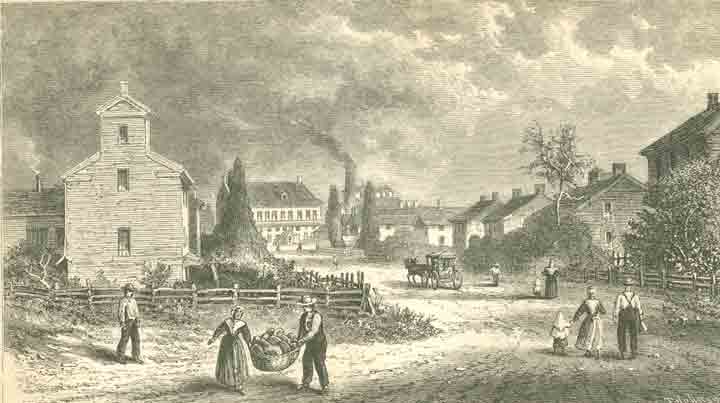A specter is haunting election-year rhetoric, the specter of socialism. All the pundits have broken into a holy fumble to decide who isn’t or isn’t a socialist.
Two things result from this fact:
1) Socialism is now acknowledged to be a powerful concept in itself.
2) Someone's got to set the record straight.
Sure, it’s a messy word, and a nasty word sometimes, and it has been for a long time. The philosopher Jean-Jacques Rousseau was called a socialist in 1765, but the word started to gain some traction in France in the 1820s, when words in -isme became fashionable. The English word seems to have been first used in 1822 by a British printer named Joseph Applegath who eventually joined an experimental community in Indiana led by Robert Owen. The community’s total failure marks the beginning of American libertarian thought–a thought that has in common with these first, “utopian” socialists that both groups are indifferent to government in any form or fashion. By the 1830s, “socialism” was used as the mirror word to “individualism.” A socialist was (and still is, for my money), someone who believes in what French workers used to call La Sociale, meaning a society in which we’re all connected, and therefore all dependent on one another, in some fashion: anybody, that is, who believes in the existence of a social contract. (Back to you, Jean-Jacques.) In which case the only people who aren’t socialists these days are libertarians who think their garbage gets picked up by the Garbage Fairy and free-market freaks who still believe in the Invisible Hand—or who believed in it as long as it was convenient, then they turned into socialists themselves. Bernard-Henri Lévy, the French philosopher-fruitcake, can’t tell socialists from sociologists, because after all “Sociology” assumes there are rational rules to the ways societies are organized. Oh, and Marxists are socialists, too. And so are communists.
Except, the fact that all Marxists and such are socialists doesn’t mean all socialists are Marxists, or communists. The early socialists wanted a redistribution of wealth in a more equitable society, but they nicely sidestepped the problem of how to get there. When in 1827, Robert Owen first used the term in print, he wrote:
The chief question between the modern... political economists and the communionists or socialists... is whether capital should be owned individually or communally.
However, since my teacher taught me to beware of the passive voice, I’m going to ask the question here: Who will own this capital? The State, the collective, the worker’s council, the Federal Reserve? Because the chiefest question of them all is, HOW will the income from that capital be distributed? If Robert Owen was as socialist, then so is Henry Paulson. In fact, until the 1870s in America, "Communist" was the name given to those lived in communes, usually religious communes, in which most things were distributed equally among peers, as opposed to those those radical class-warfare socialists, who wanted to distribute things downward:

Because of course, the issue is not whether you believe that goods should be distributed (what else are goods for?), it’s whether you believe the goods should be distributed downward, and that's was the general meaning of the the word, and still is. From that restricted point of view Obama is a socialist—a very, very mild one.
But if all Marxists are socialists, not all socialists are Marxists, let alone communists. Charlie devotes a chunk of the Communist Manifesto to drawing the distinction between his kind of socialism (“Communism”), and the other kinds. Charlie's distinction is, that Socialists (capital S, please), believe this kind of distribution can happen within the legal limits set by the State: as if government was merely a neutral observer, the umpire in the ball-game of Society. Marx, who years before had studied and critiqued the theorists of government (notably Hegel), argued that the State was actively involved in economic affairs, and therefore you could not change redistribution without changing the State: “Without revolution socialism cannot be realized.” The actual proposals put forth in the Communist Manifesto are pretty mild stuff by today’s standards, but they don’t come from a Socialist in the Marxist sense, because a Socialist for Marxists still remains a person who believes you can, indeed redistribute income without changing the State: Ever wonder why the Communists called the USSR “Socialist”?
So would that make Obama a Socialist with a capital S? It’s worth noting that the label’s not enough to damn him: “Muslim, terrorist, socialist,” all strung together, is your friendly Repugnican’s way of suggesting that Obama’s not openly proposing socialism, he’s a stealth candidate for Socialism: a crypto-commie, if you will. The deliberate confusion of the two is common in America, it was popularized in the ‘thirties by the radio personality Father Coughlin, a kind of Palin in a cassock who preferred “socialist” as a code-word because it was the term originally used by Pope Leo XIII in his 1891 encyclical "Rerum Novarum, or On the Condition of the Working Class." That still wouldn’t make Obama a Marxist but a Blanquist, a follower of the perpetually busted Auguste Blanqui for whom Marx had unlimited disdain because the idea of overthrowing governments by secret coups and putsches struck him as ridiculous. Most likely Marx would have admired Obama all the same, because Marx venerated Abraham Lincoln and admired the American political system—he thought America, if anywhere, was a country where Socialism might well be peaceably achieved.
Because that's the issue, isn't it? Whether, by any name, this country achieves a bit of fairness, a bit of decency, without the guns coming out and the midnight riders. Who knows? Marx may be proven right.
[20/10/2008; revised 2/10/2012]
